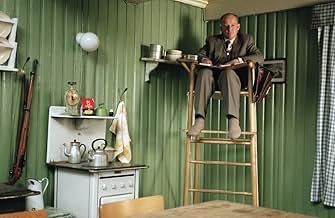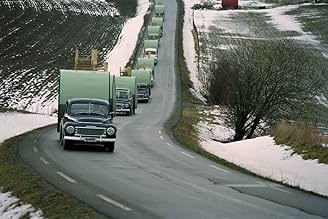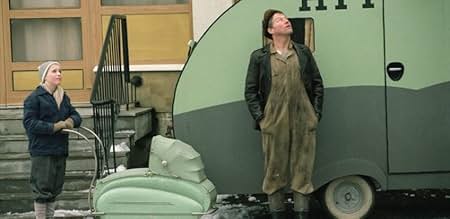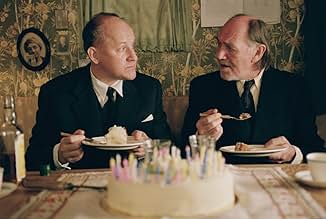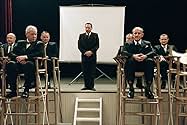IMDb-BEWERTUNG
7,3/10
8795
IHRE BEWERTUNG
Füge eine Handlung in deiner Sprache hinzuA scientific observer's job of observing an old cantankerous single man's kitchen habits is complicated by his growing friendship with him.A scientific observer's job of observing an old cantankerous single man's kitchen habits is complicated by his growing friendship with him.A scientific observer's job of observing an old cantankerous single man's kitchen habits is complicated by his growing friendship with him.
- Regie
- Drehbuch
- Hauptbesetzung
- Auszeichnungen
- 8 Gewinne & 7 Nominierungen insgesamt
Gard B. Eidsvold
- Bakkerman
- (as Gard Eidsvold)
Empfohlene Bewertungen
Imagine your job entails watching the habits of the people in their kitchens, their comings and goings: from the oven to the fridge, from the washing machine to the cupboard... How come? Well, let's say you're an employee of an enterprise that's looking forward to optimize the arrangement of people's houses to make their life more comfortable (???). You just sit there and watch your assigned "specimen". No talking, no communication between you and him. Now imagine you're the "specimen", and that there's a man sit on your kitchen observing your behavior!!!
Yeah, it's such a crazy plot, but it comes in handy for the director to express his message: man is a social creature and everybody needs someone sometime.
A small movie about small people, calm and intimate. It will make you snore by the second sequence if you're looking for some action... Otherwise, if you don't mind about contemplative cinema, this movie's gonna leave you a nice taste in your mouth.
*My rate: 7/10
Yeah, it's such a crazy plot, but it comes in handy for the director to express his message: man is a social creature and everybody needs someone sometime.
A small movie about small people, calm and intimate. It will make you snore by the second sequence if you're looking for some action... Otherwise, if you don't mind about contemplative cinema, this movie's gonna leave you a nice taste in your mouth.
*My rate: 7/10
The title may not be alluring. In fact, "Kitchen Stories" could be misleading to some that it'd be more of a women movie. Far from it - though it all may have started with the 'dazzling' multi-tetrahedrons of a chart that the self-satisfied scientist boasts of demonstrating findings on women's activity traffic in a kitchen. The snappy music sets me quite at ease in spite of anticipating reading subtitles - the melodic and light drum beats, chorus behind main vocal, sax/trumpet/trombone sounds - it's easy swinging tunes, indeed. The official site from filmsdulosange.fr gives you a feel of the 50's and a sampling of the jingle-like jazzy tune.
"Kitchen Stories" is an absolutely delightful piece. It's about a meticulously organized scientific research in the '50's on studying the kitchen behavior of single Norwegian men by assigned researchers from Sweden, in the name of advancement, of course - to improve kitchen activity efficiency. Sounds awfully dry? How can watching two men watching each other be interesting? Ah, to the genius of director Bent Hamer, who co-wrote and co-produced with Jörgen Bergmark, the film is simple enjoyment and relaxing fun. It's the discerning humor of observing human behavior of all parties involved: neighbor and neighborhood doctor, researcher and target subject, boss man and his boss - it's a film to relish and bemused upon.
Having had graphic arts, any pattern catches my eye. The opening scene - the caravan of the nine trailers each with an interesting form seen at the top of the trailer presented quite an engaging sight. Towards the end, one would realize - ah, it's that indispensable high umpire chair! Truly a well-made film and down to earth charming in all its naturalness - yes, engaging even with all the 'silent,' 'quiet,' 'observing' scenes - within and without the house.
It's also intriguing: what's happening elsewhere/upstairs while Folke Nilsson sat so quietly alone in the dark in that kitchen observation station of Isak's; what's Isak's thinking while he's piping; Grant the neighbor, what's he up to watching without a word in the cold darkness. And in the name of science, we are given insights to the 'body electric' static radio tuning.what am I talking about? Ha, that's another smilingly amusing reason to enjoy "Kitchen Stories." Thanks to the subtitles by Nick Norris, we get steady doses of chuckle and bemusing smiles throughout the film. The two main leads, Joachim Calmeyer as Isak and Tomas Norström as Folke, are fantastically 'wry' in their own self-bemused way, complementing each other's performance.
Not everything's indoors per se, there are impressive snowy landscapes, light of dawn and dead of night scenes by cinematographer Philip Øgaard. There's also a touching side story revolves around a faithful companion of a horse, and an anticipated red horse. It's full of little sprinkles of surprises and details, down to the specific food that Folke likes. Do enjoy this film. Bemused is the word repeatedly reinforced.
"Kitchen Stories" is an absolutely delightful piece. It's about a meticulously organized scientific research in the '50's on studying the kitchen behavior of single Norwegian men by assigned researchers from Sweden, in the name of advancement, of course - to improve kitchen activity efficiency. Sounds awfully dry? How can watching two men watching each other be interesting? Ah, to the genius of director Bent Hamer, who co-wrote and co-produced with Jörgen Bergmark, the film is simple enjoyment and relaxing fun. It's the discerning humor of observing human behavior of all parties involved: neighbor and neighborhood doctor, researcher and target subject, boss man and his boss - it's a film to relish and bemused upon.
Having had graphic arts, any pattern catches my eye. The opening scene - the caravan of the nine trailers each with an interesting form seen at the top of the trailer presented quite an engaging sight. Towards the end, one would realize - ah, it's that indispensable high umpire chair! Truly a well-made film and down to earth charming in all its naturalness - yes, engaging even with all the 'silent,' 'quiet,' 'observing' scenes - within and without the house.
It's also intriguing: what's happening elsewhere/upstairs while Folke Nilsson sat so quietly alone in the dark in that kitchen observation station of Isak's; what's Isak's thinking while he's piping; Grant the neighbor, what's he up to watching without a word in the cold darkness. And in the name of science, we are given insights to the 'body electric' static radio tuning.what am I talking about? Ha, that's another smilingly amusing reason to enjoy "Kitchen Stories." Thanks to the subtitles by Nick Norris, we get steady doses of chuckle and bemusing smiles throughout the film. The two main leads, Joachim Calmeyer as Isak and Tomas Norström as Folke, are fantastically 'wry' in their own self-bemused way, complementing each other's performance.
Not everything's indoors per se, there are impressive snowy landscapes, light of dawn and dead of night scenes by cinematographer Philip Øgaard. There's also a touching side story revolves around a faithful companion of a horse, and an anticipated red horse. It's full of little sprinkles of surprises and details, down to the specific food that Folke likes. Do enjoy this film. Bemused is the word repeatedly reinforced.
There's no avoiding it: "Kitchen Stories" is hopelessly boring. It is slow, uneventful, tacit, and wry. But that is not necessarily a bad thing. It also happens to be hilariously understated and brilliantly dry. It's motive is clear and straightforward, there are no surprises or twists, only the observation of two men: one who must observe, the other who must be observed. Of course, humans are not meant to be that way, and everything falls out of the way it is supposed to. The scientific study of single male's kitchen activities is carried out in high chairs strategically placed in the corner of the kitchen. But the observer, Folke, and the observed, Isak, form a friendship and a bond, quietly, and ever so slowly. There is a small twist at the end, but when you think about it, with all of the very small funny moments leading up to it (getting radio stations through a gold tooth, Isak eating dinner in his room instead of his kitchen), you realize at the end that everything is the way it should be. This movie is a small masterpiece, slow and dry, yet hilarious and perfect. This is a movie with no villains and no heroes, just regular people, eating in their kitchen. At the end, even though you may have looked at your watch a few times, you leave satisfied and with a silly little grin on your face.
My grade: 7.5/10
My grade: 7.5/10
Having just seen Kaurismaki's dryly-witty `Man Without a Past,' I couldn't believe that director Bent Hamer's `Kitchen Stories' is actually drier and funnier. The Norse/Swedish co-production depicts 1950's Swedes studying bachelors in their kitchens to improve their lives. Swedish scientist Folke, in a high chair like some infantile god, observes Norwegian Isak under the restriction that he must not interact with Isak.
The humor comes from the stereotypical Swede as uptight and organized and the Norwegian as slow but solid. The silliness of the experiment itself is obvious and the restriction ludicrous because of course they will interact, in fact bond, given the loneliness of Norway's winter and the need for humans to be sociable. That the story turns on male bonding is a bonus, especially because neither country is considered a bastion of sociability. When Isak lets Folke listen to the radio on his teeth fillings, I figure the guys are in for some warm nights.
In another way, this film could be as good as it gets for analyzing the effect observers have on their subjects, be it laboratory or media. A question probably unanswerable even today is how much anyone changes under observation. In the case of the central characters in `Kitchen Stories,' the change is considerable, but more so just because of another human being's presence in an otherwise lonely world. The credibility of documentaries and scientists is on the table here.
The minimal dialogue and occasional joke, spiced with subtle racial stereotyping, makes me think of not only Kaurismaki but also Beckett, whose waiting characters sometime talk nonsense, but most of the time profundity under the guise of simplicity. `Kitchen' is a slow but rewarding film that strips life of its pretensions to study more closely the tissue that binds humanity with communication.
Diplomat Dag Hammarskjold in his Markings caught the minimalism of this film: `Friendship needs no words-it is solitude delivered from the anguish of loneliness.'
The humor comes from the stereotypical Swede as uptight and organized and the Norwegian as slow but solid. The silliness of the experiment itself is obvious and the restriction ludicrous because of course they will interact, in fact bond, given the loneliness of Norway's winter and the need for humans to be sociable. That the story turns on male bonding is a bonus, especially because neither country is considered a bastion of sociability. When Isak lets Folke listen to the radio on his teeth fillings, I figure the guys are in for some warm nights.
In another way, this film could be as good as it gets for analyzing the effect observers have on their subjects, be it laboratory or media. A question probably unanswerable even today is how much anyone changes under observation. In the case of the central characters in `Kitchen Stories,' the change is considerable, but more so just because of another human being's presence in an otherwise lonely world. The credibility of documentaries and scientists is on the table here.
The minimal dialogue and occasional joke, spiced with subtle racial stereotyping, makes me think of not only Kaurismaki but also Beckett, whose waiting characters sometime talk nonsense, but most of the time profundity under the guise of simplicity. `Kitchen' is a slow but rewarding film that strips life of its pretensions to study more closely the tissue that binds humanity with communication.
Diplomat Dag Hammarskjold in his Markings caught the minimalism of this film: `Friendship needs no words-it is solitude delivered from the anguish of loneliness.'
When I picked up this DVD, I noticed two prominent words on the front--"Hilarious" and "Funny". After seeing the film, I think these are both completely inappropriate descriptions of the film. So, of course, some advertising idiots decided to promote this as a hilarious comedy, even though this did not appear to be the intention of those who made the movie! There are a few mildly funny moments, but it just isn't a comedy. Instead, it's a slight slice of life film about a Swedish company that prides itself on scientifically investigating EVERYTHING there is about kitchens. The story centers on one of their studies which is done with Norwegian bachelors. They decided to send observers into these kitchens and passively watch and record the movement patterns of these men. The observers and observed are under strict orders NOT to interact in any way.
This story centers on one home. At first, the bachelor doesn't want to even allow the observer in the home. Then, once he begrudgingly lets him in, their relationship is pretty tense. However, over time it is natural that a bond is created between them. The acting is good and the story generally pretty compelling. Not a bad little unusual film, but for some reason the writers decided to end the movie on a down note--I can understand the choice, but don't agree with it at all.
This story centers on one home. At first, the bachelor doesn't want to even allow the observer in the home. Then, once he begrudgingly lets him in, their relationship is pretty tense. However, over time it is natural that a bond is created between them. The acting is good and the story generally pretty compelling. Not a bad little unusual film, but for some reason the writers decided to end the movie on a down note--I can understand the choice, but don't agree with it at all.
Wusstest du schon
- WissenswertesAt the beginning of the film, Malmberg (a Swede) becomes ill after having to drive on the right side of the road in Norway. Today both countries drive on the right. In 1967, Sweden switched to the right because making two versions of cars like Volvos and Saabs for domestic and foreign sales was inefficient. Also, there are many unguarded, unmarked border crossings points (unlike the crossing in the film); people would not realize which country they were in and sometimes ended up driving on the wrong side.
- VerbindungenSpoofed in Brødrene Dal og mysteriet med Karl XIIs gamasjer: Folge #1.1 (2005)
- SoundtracksVisa Från Utanmyra
Performed by Jan Johansson
Top-Auswahl
Melde dich zum Bewerten an und greife auf die Watchlist für personalisierte Empfehlungen zu.
- How long is Kitchen Stories?Powered by Alexa
Details
Box Office
- Bruttoertrag in den USA und Kanada
- 351.235 $
- Eröffnungswochenende in den USA und in Kanada
- 48.103 $
- 22. Feb. 2004
- Weltweiter Bruttoertrag
- 2.823.472 $
- Laufzeit1 Stunde 35 Minuten
- Farbe
- Sound-Mix
- Seitenverhältnis
- 1.85 : 1
Zu dieser Seite beitragen
Bearbeitung vorschlagen oder fehlenden Inhalt hinzufügen


